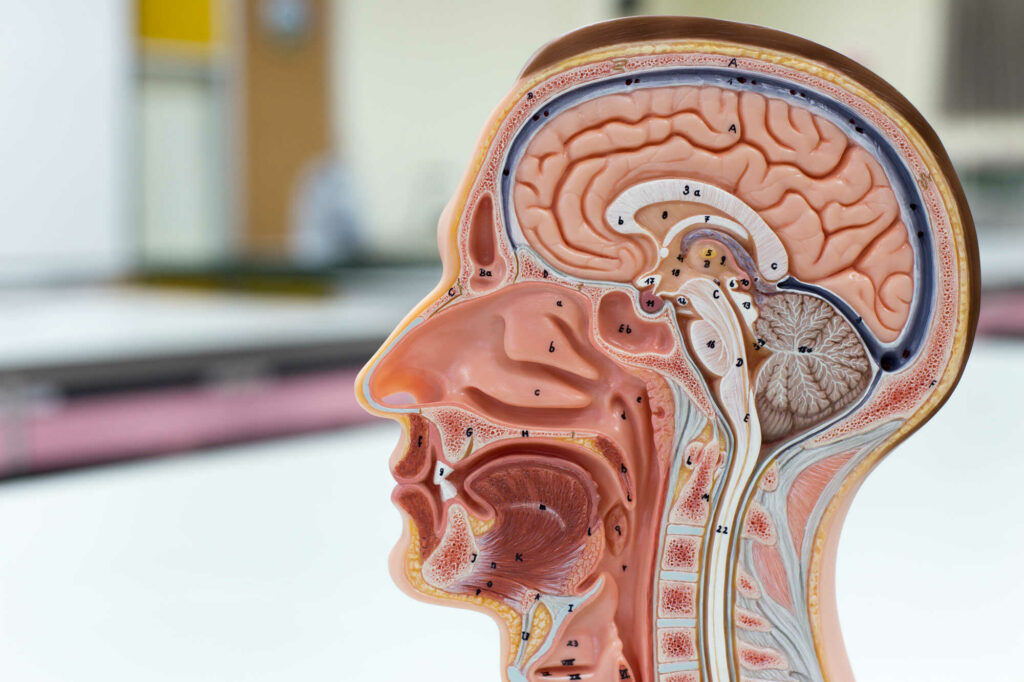Hormones produced by the pituitary gland
Hormones are made in endocrine glands and passed directly into the blood. Generally, the higher the amount of hormone that is in the blood, the greater the effect.
The two sections of the pituitary gland (the anterior and posterior) produce a number of different hormones which act on different target glands or cells.
Hormones produced by the anterior pituitary:
- Adrenocorticotrophic hormone (ACTH)
- Thyroid-stimulating hormone (TSH)
- Luteinising hormone (LH)
- Follicle-stimulating hormone (FSH)
- Prolactin (PRL)
- Growth hormone (GH)
- Melanocyte-stimulating hormone (MSH)
Hormones produced by the posterior pituitary:
- Anti-diuretic hormone (ADH)
- Oxytocin
Control of hormone production is monitored continuously and regulated using feedback loops.
Hormone comes from the Greek word ‘hormao’ meaning “I excite” and refers to the fact that each hormone excites or stimulates a particular part of the body known as the target gland.
Table of pituitary hormones
| HormoNe | target(s) | function |
| Adrenocorticotrophic hormone (ACTH) | Adrenals | Stimulates the adrenal gland to produce a hormone called cortisol. ACTH is also known as corticotrophin. |
| Thyroid-stimulating hormone (TSH) | Thyroid | Stimulates the thyroid gland to secrete its own hormone, which is called thyroxine. TSH is also known as thyrotrophin. |
| Luteinising hormone (LH) & follicle-stimulating hormone (FSH) | Ovaries (women), testes (men) | Controls reproductive functioning and sexual characteristics. Stimulates the ovaries to produce oestrogen and progesterone and the testes to produce testosterone and sperm. LH and FSH are known collectively as gonadotrophins. LH is also referred to as interstitial cell stimulating hormone (ICSH) in males |
| Prolactin (PRL) | Breasts | Stimulates the breasts to produce milk. This hormone is secreted in large amounts during pregnancy and breast feeding, but is present at all times in both men and women. |
| Growth hormone (GH) | All cells in the body | Stimulates growth and repair. Research is currently being carried out to identify the functions of GH in adult life. |
| Melanocyte-stimulating hormone (MSH) | Exact role in humans is unknown. | |
| Anti-diuretic hormone (ADH) | Kidneys | Controls the blood fluid and mineral levels in the body by affecting water retention by the kidneys. This hormone is also known vasopressin or argenine vasopressin (AVP). |
| Oxytocin | Uterus & breasts | Affects uterine contractions in pregnancy and birth and subsequent release of breast milk. |
Hormones produced by the hypothalamus
The secretion of hormones from the anterior pituitary is controlled by the production of hormones by the hypothalamus. Although there are a number of different hormones they can be split into two main types:
- Hormones that tell the pituitary to switch on production of a hormone (a releasing hormone)
- Hormones that tell the pituitary to switch off production of a hormone (an inhibiting hormone)
The hormones secreted by the posterior pituitary are produced in the hypothalamus and then passed down a tube between the hypothalamus and the pituitary (the pituitary stalk) where they are then secreted into the blood.
Hormones produced by other glands in the body
In total, more than 200 hormones or hormone-like substances have been discovered. In addition to the hormones listed in the table above, five of these hormones are controlled by hormones released by the pituitary.
| Hormone | organ | function |
| Cortisol | Adrenals | Cortisol has a number of functions. It promotes normal metabolism, maintains blood sugar levels and blood pressure, provides resistance to stress and acts as an anti-inflammatory agent. It also plays a part in regulation of fluid balance in the body. |
| Thyroxine | Thyroid | Thyroxine controls many body functions, including heart rate, temperature and metabolism. It also plays a role in the metabolism of calcium in the body. |
| Oestrogen | Ovaries | Oestrogen facilitates growth of the tissues of the sex organs and other tissues related to reproduction. Oestrogen also acts to strengthen bones and has a protective effect on the heart. |
| Progesterone | Ovaries | Progesterone promotes the changes in the uterus that occur in preparation for the implantation of a fertilised ovum (egg) and prepares the breasts for milk production. |
| Testosterone | Testes | Testosterone is responsible for the characteristics of the masculine body, including hair growth on the face and body and muscle development. Testosterone is essential for the production of sperm and also acts to strengthen bones. |
You can learn more about glands and hormones, as well as educational resources, on the Society for Endocrinology’s ‘You and Your Hormones’ website










